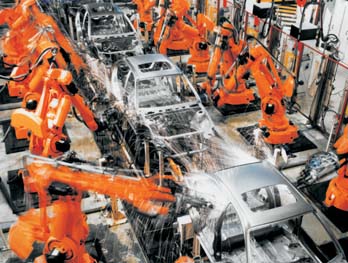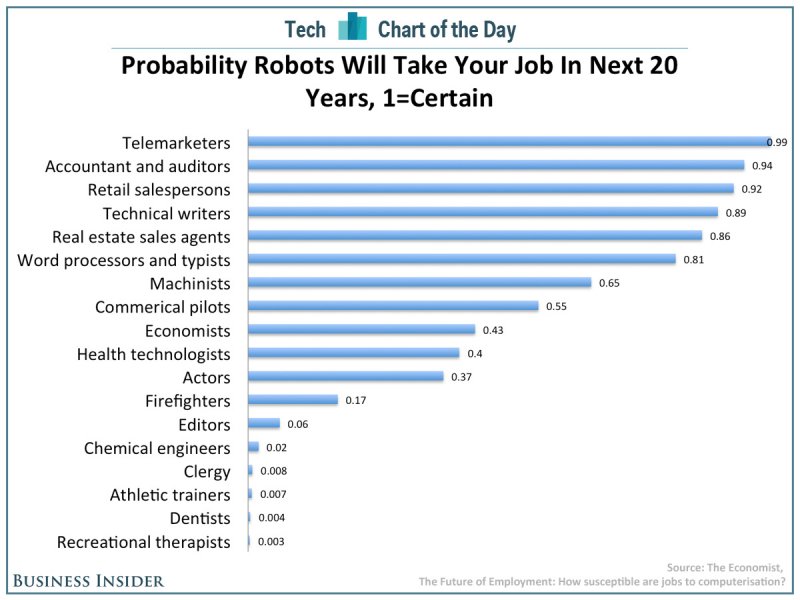Stealing jobs back from the machines
We've been hearing the alarm bells, (heck many of us, well mostly me) have been ringing those bells, the ones that are tolling for the eventual and perhaps even imminent demise of the American worker, destined to be replaced by a robot or an algorithm.
Automation is continuing apace and advances in computing power, combined with development of more sophisticated robotics and smart machines that create and communicate massive amounts of data are causing a perfect storm of sorts. Routine work is likely to be automated out of human hands, lower-complexity service jobs are under threat, and even many types of 'knowledge work' are becoming targets of the relentless pace and unwavering progress of automation and technology.
It is a story that keeps getting repeated so often lately that it is simultaneously getting tired and self-fulfilling.
That's why this piece, 'Gods' Make Comeback at Toyota as Humans Steal Jobs from Robots , from Bloomberg about what a possible brighter future of work and human worker's co-existence with the robots might look like was both surprising and instructive. The piece is about how at Toyota, long a leader in applying advanced theories, processes, and technologies to the manufacturing environment, was actually introducing (or re-introducing, I suppose), more human-powered and manual labor-based processes into many of its plants.
Why put slower, more expensive, more likely to mess up, and definitely more likely to need a rest after 8 hours or so humans back into the manufactring flow?
From the Bloomberg piece:
Inside Toyota Motor Corp.’s oldest plant, there’s a corner where humans have taken over from robots in thwacking glowing lumps of metal into crankshafts. This is Mitsuru Kawai’s vision of the future.
“We need to become more solid and get back to basics, to sharpen our manual skills and further develop them,” said Kawai, a half century-long company veteran tapped by President Akio Toyoda to promote craftsmanship at Toyota’s plants. “When I was a novice, experienced masters used to be called gods, and they could make anything.”
These gods, or Kami-sama in Japanese, are making a comeback at Toyota, the company that long set the pace for manufacturing prowess in the auto industry and beyond. Toyota’s next step forward is counter-intuitive in an age of automation: Humans are taking the place of machines in plants across Japan so workers can develop new skills and figure out ways to improve production lines and the car-building process.
Learning how to make car parts from scratch gives younger workers insights they otherwise wouldn’t get from picking parts from bins and conveyor belts, or pressing buttons on machines. At about 100 manual-intensive workspaces introduced over the last three years across Toyota’s factories in Japan, these lessons can then be applied to reprogram machines to cut down on waste and improve processes, Kawai said.
In an area Kawai directly supervises at the forging division of Toyota’s Honsha plant, workers twist, turn and hammer metal into crankshafts instead of using the typically automated process. Experiences there have led to innovations in reducing levels of scrap and shortening the production line 96 percent from its length three years ago. Toyota has eliminated about 10 percent of material-related waste from building crankshafts at Honsha. Kawai said the aim is to apply those savings to the next-generation Prius hybrid.
Really interesting and perhaps this story foretells one likely scenario for the future of work - a kind of hybrid and peaceful co-existence and co-operation between human and machine. One where each actor can supply and focus on what they do best. The machines are precise, indefatigable, obedient, unerring. The people focusing on creativity, adaptability, recalling institutional memory and lessons. Then the combination of the two leading to the best outcomes for both (and the organization). The humans 'learn' then teach the machines to carry out these learnings.
Which is kind of the way it has always been until recently, when it seems like we have allowed the advances in automation to allow us to forget that we humans still have much to offer and much to teach the machines.

 Steve
Steve

